Below is a list of the best payroll software solution providers for your business to consider. Whether you’re a small startup or an established enterprise, these vendors offer a wide range of features and functionalities to fit your organization’s needs.
PrimePay: Best for Growing Companies
PrimePay’s online payroll software is a robust and intuitive solution crafted to facilitate seamless payroll management for businesses of all sizes. The software features automated payroll processing, compliance management, and scalability to accommodate the evolving needs of expanding companies. PrimePay empowers organizations on their growth journey.
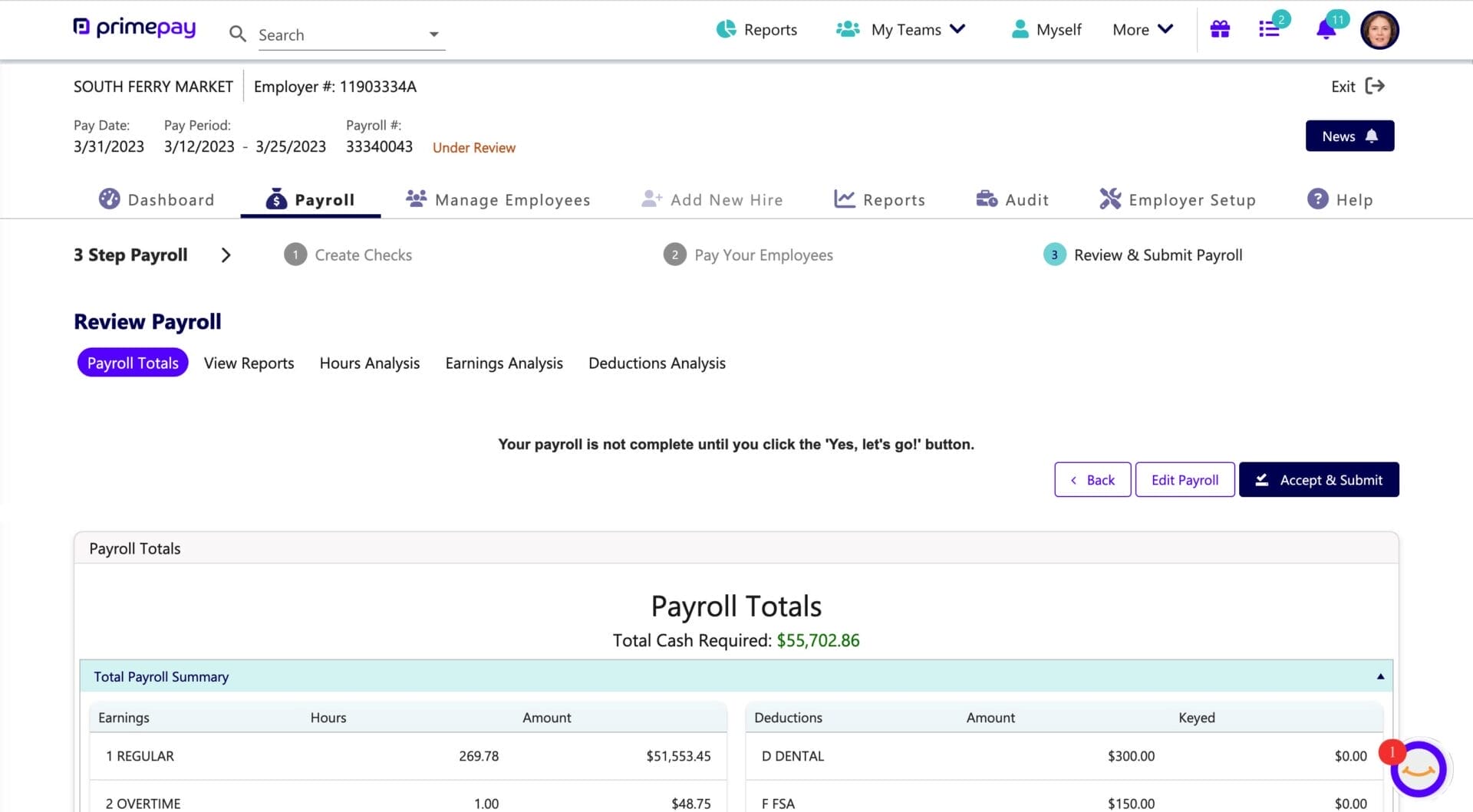
Key Features:
- Versatile Platform: PrimePay is designed as a ‘plug and play’ platform. Defined by options, it allows businesses to start with basic payroll or HR functions and add features as their needs evolve.
- Simplified Processes: The platform aims to streamline the payroll process, ensuring that checks are accurate, taxes are taken care of, and benefits are clearly outlined.
- Comprehensive Services: PrimePay handles a wide range of services, including payroll, HR, ATS, time tracking, and benefits management.
- Payroll Tax Filing: File federal, state, and local taxes automatically across 50 states.
Pros:
- Comprehensive Solution: PrimePay offers a range of features covering various payroll needs, appreciated by businesses of different sizes.
- Versatile and Scalable: Tailored solutions and bundles that grow with the needs of your business.
- HR-Add On: Ability to add and integrate HR software to your existing payroll provider.
- User-Friendly Interface: The platform is praised for its ease of use, making payroll and HR tasks more enjoyable.
Cons:
- Expensive: PrimePay’s monthly minimum makes the platform costly for smaller clients.
- Issues with Customer Service: Some users have noted inconsistencies in customer support, particularly with a need for dedicated representatives.
Client Review:
“PrimePay is a relatively easy-to-use program that makes payroll and tax season easier. Payroll is a breeze with Primepay, and setting up new employees is quick and easy. Employees can easily access all their payroll information. Primepay makes tax season easier by sending out 1099s and creating tax packages containing all the necessary information. PrimePay support is very helpful.”
Gusto: Best for Remote-First Companies
Gusto is a comprehensive and user-friendly platform designed to streamline and simplify the payroll process for businesses. With features like automated tax filings, employee self-service, and compliance management, Gusto offers an efficient solution for efficiently managing payroll tasks.
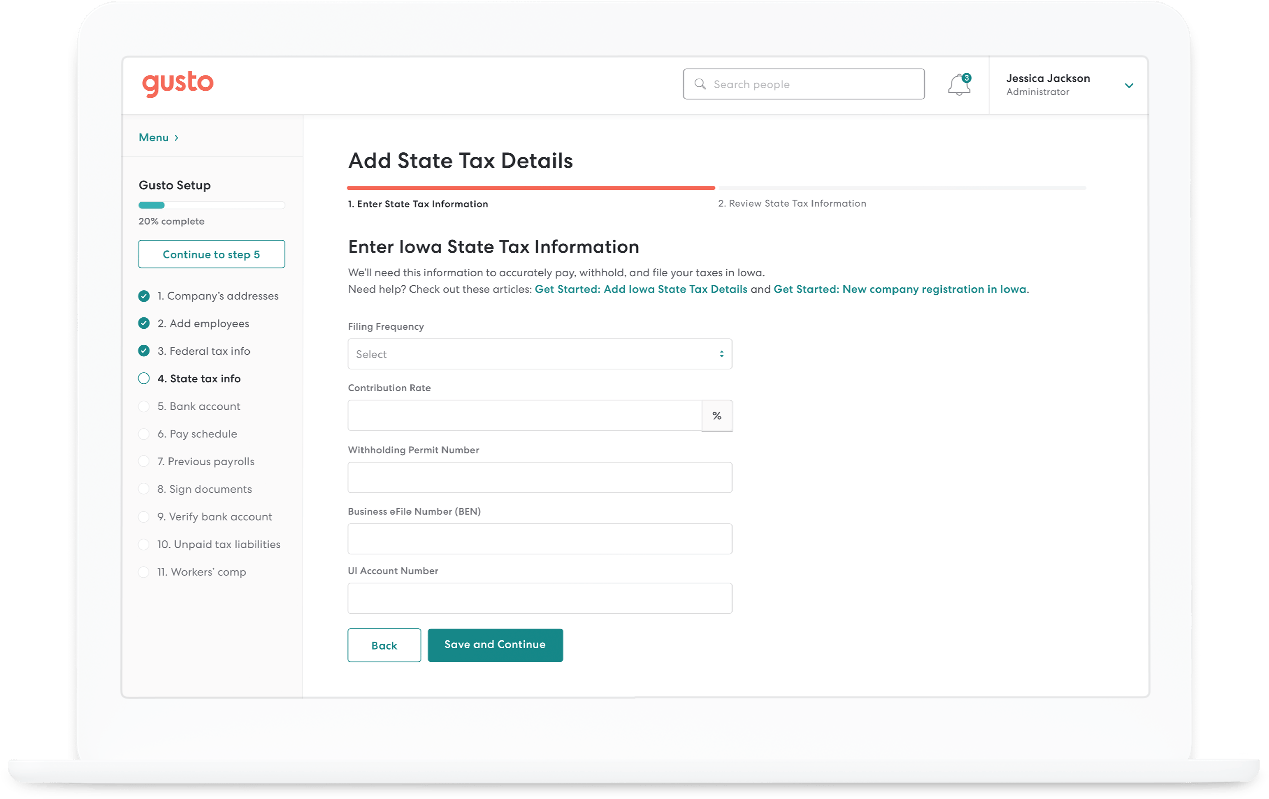
Key Features:
- Gusto Global: Puts all employee information in one place but adapts to their local currency and compliance requirements.
- Time Tracking Integration: Bundling time tracking with full-service payroll, it’s a comprehensive solution for businesses.
- Multiple Direct Deposit Options: Offers flexibility in payment methods, catering to diverse employee preferences.
Pros:
- User-Friendly Interface: Gusto’s intuitive design makes navigation and payroll management straightforward.
- Comprehensive Payroll Services: Includes full-service payroll, 1099s, and W-2s, ensuring all payroll needs are covered.
- Basic HR Tools: Ideal for businesses looking for simple yet effective HR solutions, including hiring and onboarding.
Cons:
- Limited Multi-State Payroll in Base Plan: The Simple plan restricts payroll to a single state, which may not suit businesses operating across multiple states.
- Complexities for Larger Businesses: Gusto might not be the best fit for companies with more than 1000 employees.
- Pricing Structure: Some users find Gusto’s pricing high, especially for small businesses with limited needs.
Client Review:
“I’ve been using Gusto for 4 years and it’s consistently impressed me with its ease of use and efficient customer support. Running payroll is a breeze, and the service saves me considerable time. The issues I’ve encountered, minor and mostly self-inflicted, were resolved promptly. Gusto’s user-centric design and functionality make it an essential tool for my business operations. I highly recommend it to other small to midsize business owners.”
OnPay: Best for Companies Seeking Industry-Specific Solutions
OnPay offers is a user-friendly and cloud-based platform that simplifies payroll processing for small and medium-sized businesses. Offering features like automated tax calculations, direct deposit, and employee self-service, OnPay provides a convenient and efficient solution for companies seeking a payroll processor for their specific industry.
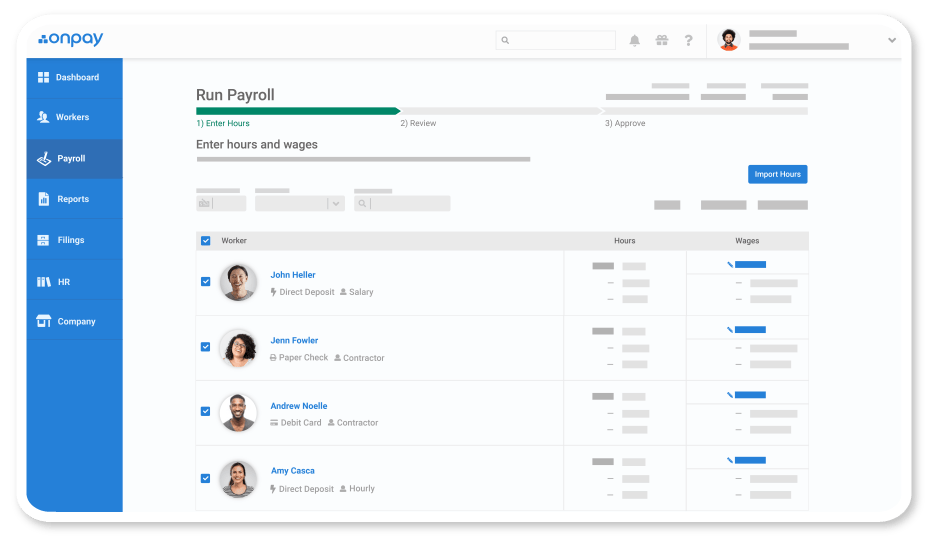
Key Features:
- Full-Service Payroll Plan: OnPay offers a comprehensive, full-service payroll plan. This includes direct deposit, tax filings, W-2s, 1099s, setup, data migration, software integrations, and HR tools.
- Specialized Services: OnPay provides services tailored to various industries such as restaurants, farms, nonprofits, and larger companies.
- Custom Reporting: The software offers robust custom payroll reporting features, catering to diverse business needs.
Pros:
- Comprehensive Service: Offers a full-service package without the need for add-ons or upgrades.
- Ease of Use: Praised for its user-friendly interface and logical workflow.
- Excellent Customer Support: Known for timely and helpful customer service, ensuring a smooth user experience.
Cons:
- Limited Integration Options: May not suit businesses seeking extensive integration capabilities.
- Pricing: Positioned at the higher end of the market, which might concern very small businesses.
- Onboarding Process: Some users need more detailed guidance to navigate the onboarding process.
Client Review:
“OnPay has transformed our payroll process. It’s user-friendly, efficient, and their customer service is top-notch. As a small business owner, it’s a relief to know that payroll is one less thing to worry about. Highly recommended for any SMB looking for a reliable payroll solution.”
Intuit QuickBooks: Best for Companies That Use QuickBooks Accounting
Intuit QuickBooks Payroll offers various features for small to medium-sized businesses. This versatile software combines the power of QuickBooks’ renowned accounting prowess with efficient payroll processing.
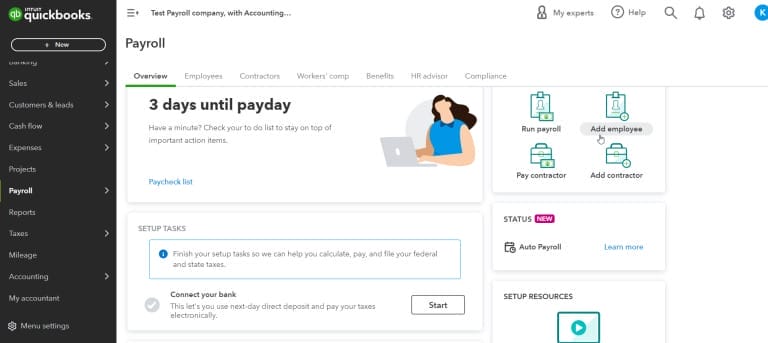
Key Features:
- Next-Day Direct Deposit: Ensuring timely payment processing.
- Automatic Tax Filing: Handles both state and federal taxes, reducing administrative burdens.
- Integration with QuickBooks Products: Seamlessly works with other Intuit services, which is ideal for existing Intuit users.
- Higher-Tier Bookkeeping Tools: In the premium plans, features like expense tracking, invoicing, time tracking, and inventory tracking are available.
Pros:
- Integrated Solution: Streamlines accounting and payroll in one platform.
- Comprehensive Tax Handling: Automates most tax-related tasks.
- Scalable Plans: Options available from basic to advanced needs.
Cons:
- Cost Factor: The basic plan is relatively expensive for small businesses.
- Limited Integrations: Integration mainly within Intuit products; may not suit businesses using diverse software ecosystems.
- Local Tax Automation: Does not fully automate local taxes, which can be a drawback for some businesses.
Client Review:
“I’ve been using QuickBooks Payroll for our small business, and it’s been a lifesaver. The integration with QuickBooks accounting makes our financial management much smoother. While it’s a bit pricey, the time saved on tax filings and payroll processing makes it worth it. However, I wish it had more integrations outside the Intuit ecosystem.”
Patriot: Best for Smaller Businesses with Tight Budgets
Patriot is a cost-effective solution tailored for businesses with tighter budgets, providing essential payroll features without compromising quality. With its user-friendly interface, affordable pricing, and core functionalities like tax filing and direct deposit, Patriot Payroll caters to small businesses seeking efficient payroll management within financial constraints.
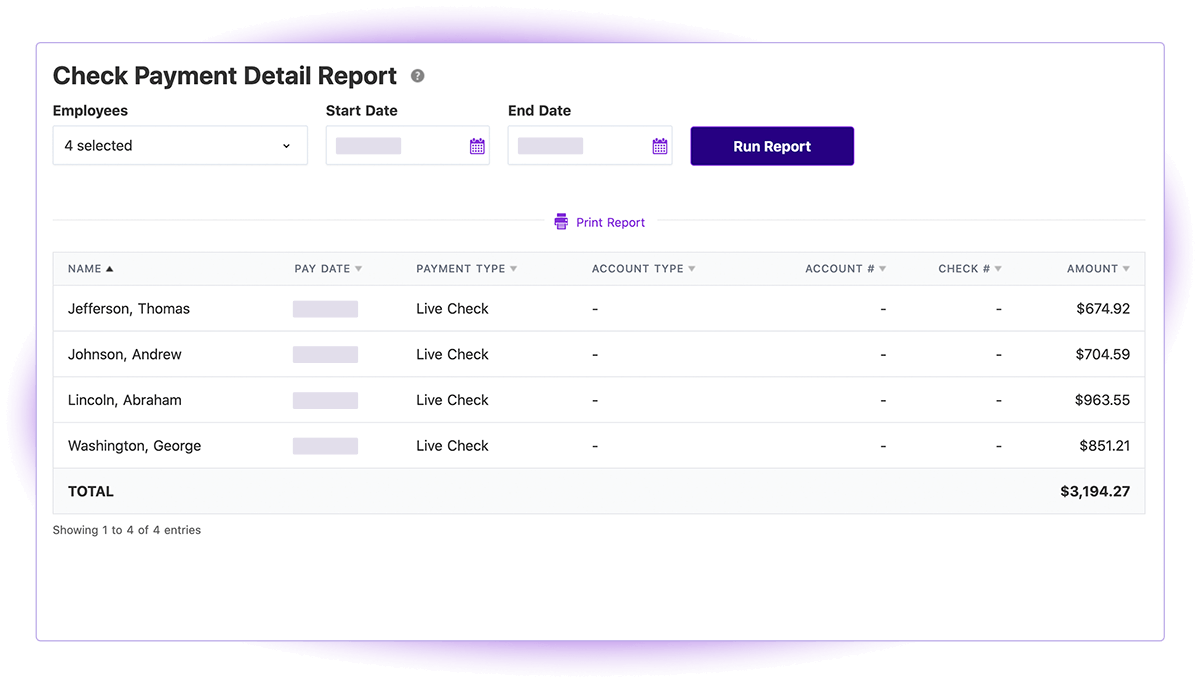
Key Features:
- Focuses on small to medium-sized businesses: Tailored for small to medium-sized companies in the United States, supporting 1 to 500 users.
- Two plan options: Basic and Full-Service are the two main plan options, with the latter including tax filing services.
- Essential features: Direct deposit, time-off accruals, the ability to pay contractors, unlimited payrolls, and W-2s.
- Quick payroll processing time: Customers average less than three minutes to run payroll.
Pros:
- Affordability: Both Basic and Full-Service plans are competitively priced, making it an excellent choice for businesses with tighter budgets.
- Customer Support: Patriot provides excellent customer service with responsive and knowledgeable support staff.
- Flexibility: The platform is adaptable, with various integrations and customization options.
- Efficient Payroll Processing: The system is designed for speed and simplicity in payroll management.
Cons:
- Limited Features for Larger Businesses: May not be suitable for larger companies due to its focus on small to medium-sized business needs.
- Geographical Limitation: Mainly for businesses based in the United States; not ideal for international operations.
- Additional Costs for Integrations: While integrations are available, they might increase the overall cost.
- Limited Reporting Features: Some users desire more comprehensive reporting capabilities.
- Limited Customization in Certain Areas: Some users find restrictions in customizing payroll processes like salary adjustments.
Client Review:
“I’ve been using Patriot Payroll for over a year now, and it’s been a game-changer for my small business. The affordability was a major draw, but the ease of use and exceptional customer support have made me a loyal customer. Running payroll is now a breeze, and I’ve saved so much time. The fact that I can easily integrate it with other tools I use is just the icing on the cake. Highly recommend Patriot for any small business owner!”
Rippling: Best for Companies Planning International Expansion
Rippling is an ideal solution for companies planning international expansion, offering a comprehensive platform that seamlessly integrates payroll management across borders. With its global capabilities, automated compliance features, and centralized control, Rippling provides businesses with a robust tool to navigate the complexities of payroll when expanding operations internationally.
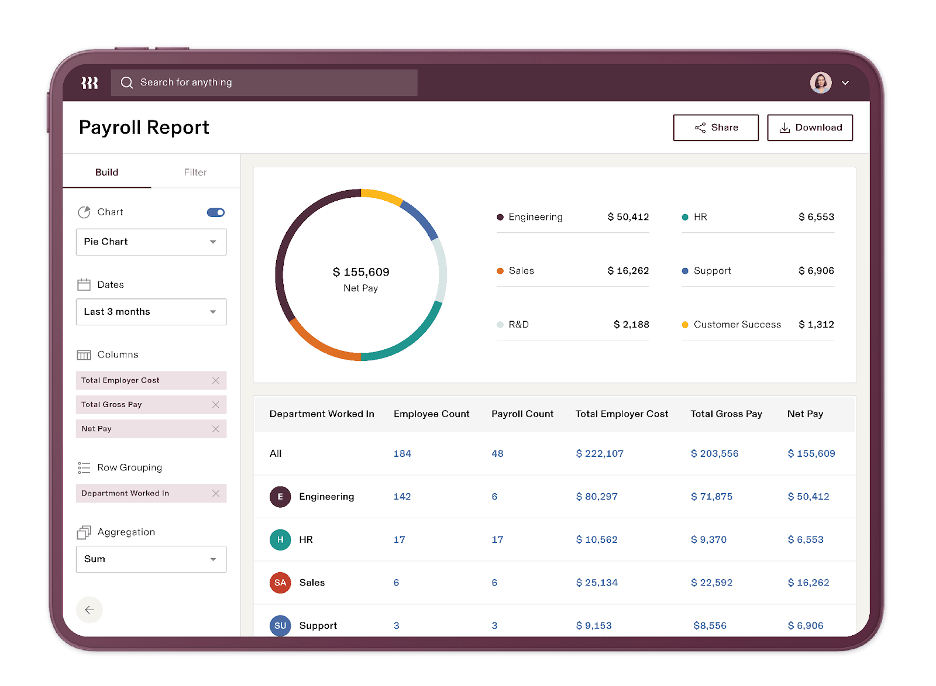
Key Features:
- Global Reach: Rippling shines in its ability to manage international employees. Its tools facilitate onboarding, local currency payroll, and local law compliance.
- Comprehensive Integration: Rippling is more than a payroll service; it integrates HR, IT, and Finance, offering a holistic approach to workforce management.
- Efficient Onboarding: Capable of setting up various aspects such as payroll, corporate cards, and third-party apps quickly and efficiently.
Pros:
- Time Efficiency: The platform streamlines various processes, saving significant time for users.
- Versatile Integrations: Supports a wide range of third-party applications, ensuring flexibility and broad applicability.
- Scalability: Suitable for businesses experiencing growth, accommodating expanding HR and payroll needs without added complexity.
Cons:
- Technical Issues: Some users have reported encountering technical glitches or bugs.
- Complexity in Adjusting Employee Information: Adjustments can sometimes be more complex, requiring time to navigate and understand the process.
- Pricing Opacity: Rippling’s pricing structure isn’t transparent, necessitating discussions with representatives for detailed quotes.
- Limited Use for Very Small Businesses: Not ideal for businesses seeking only basic payroll processing.
Client Review:
“I find Rippling to be a game-changer in simplifying my work life. What I like best about Rippling is the convenience of having everything in one place. From payroll and health insurance to managing my 401k and HSA, Rippling streamlines the entire process. The centralized platform not only saves time but also ensures that I have a comprehensive view of all aspects of my benefits and financials. It’s user-friendly and efficient, providing a seamless experience that has significantly enhanced my day-to-day work management.”
Papaya Global: Best for Companies Managing a Global Workforce
Papaya Global is an optimal choice for companies with a global workforce, offering a comprehensive platform designed to streamline and simplify international payroll management. With features tailored for cross-border compliance, multi-country payroll processing, and global workforce visibility, Papaya empowers businesses to navigate the complexities of managing payroll on a worldwide scale efficiently.
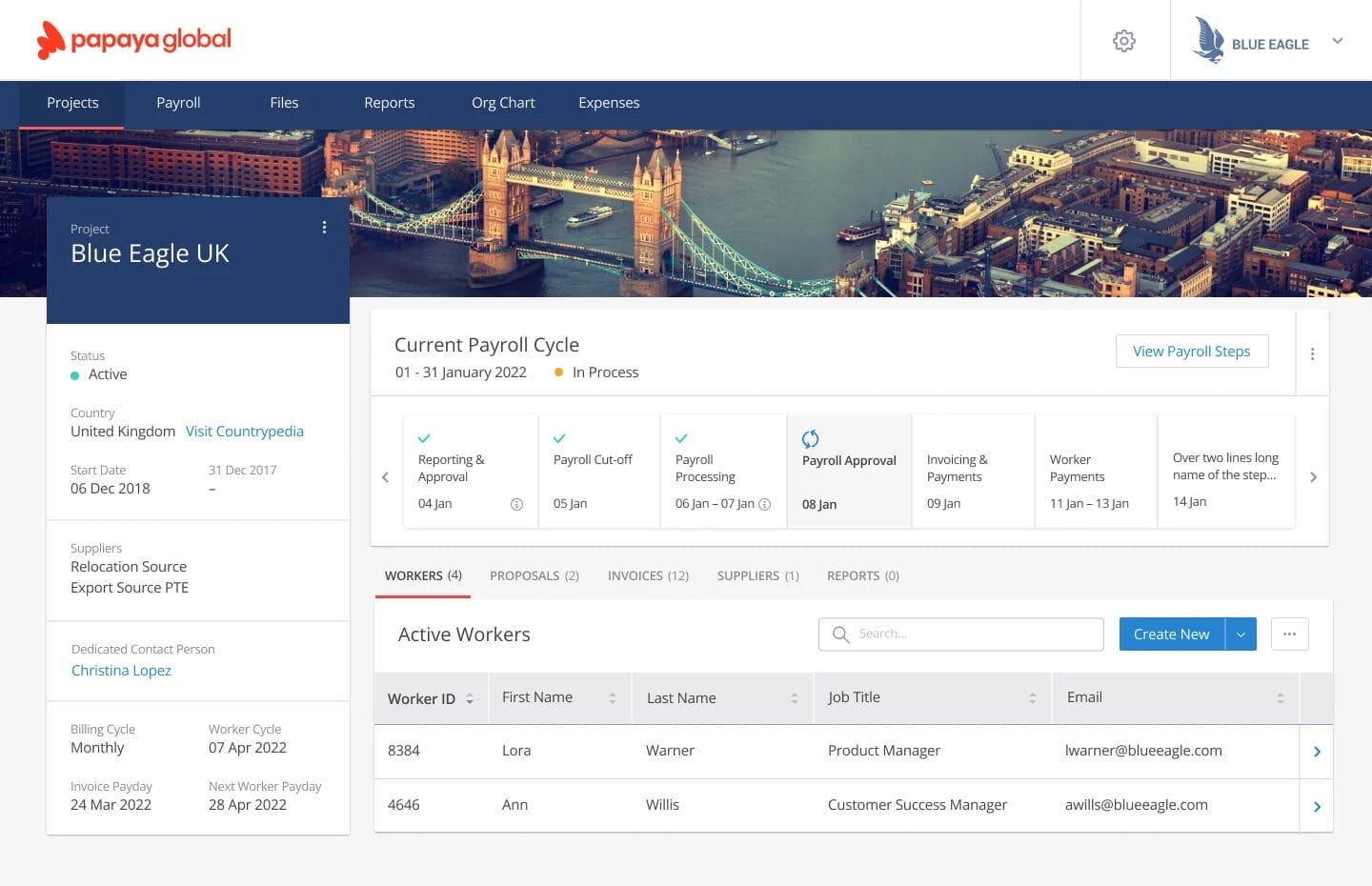
Key Features:
- Global Payroll Services: Papaya Global offers payroll solutions across 160 countries, ideal for managing a global workforce.
- End-to-End Employer of Record (EOR): The software assists in onboarding, managing, and paying international staff, as well as handling work and residence permits for employees working overseas.
- Contract Worker Management: Efficiently manages contract workers, ensuring compliance and smooth operations.
- Multi-Language and Multi-Currency Support: Pay stubs can be generated in local languages, and the system can process multicurrency and cross-border payments.
Pros:
- International Business Suitability: Ideal for businesses managing international staff, offering robust support in various countries.
- Comprehensive HR Solutions: Offers a wide range of services from payroll to workforce management, simplifying HR complexities.
- Local Compliance and Support: Ensures compliance with local regulations and provides expert support for diverse workforce management.
Cons:
- Pricing: Generally more expensive than competitors, with costs increasing based on services and employee numbers.
- Complex for smaller businesses: Robust features and a focus on global workforce management may be more extensive than required for more straightforward payroll scenarios.
Client Review:
“Papaya Global is a very helpful solution in order to manage payroll for several locations: having everything on the same platform, a single point of contact, and the same format for every report, is very valuable. The platform is also user friendly, and the Payroll experts are available for any question.”
Paychex: Best for Companies Seeking Support via Telephone
Paychex software offers robust solutions that strongly emphasize providing exceptional customer service, ensuring businesses receive dedicated support for their payroll needs.
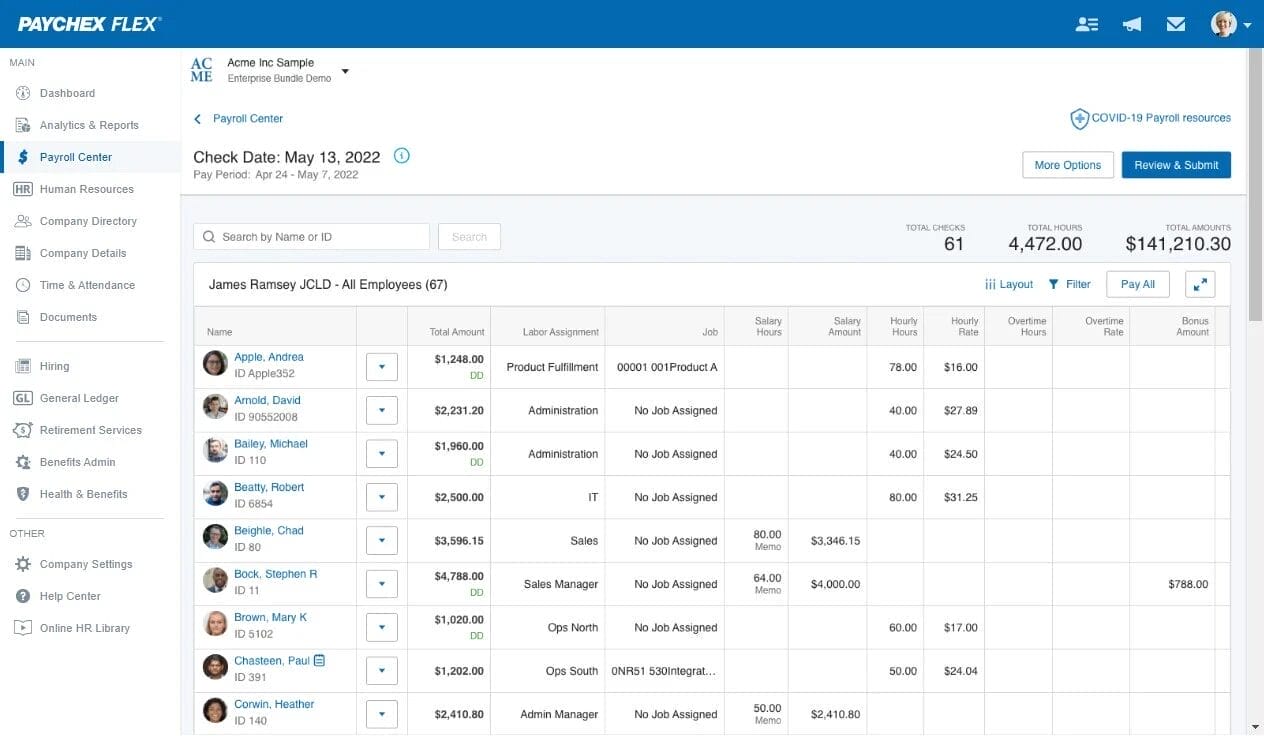
Key Features:
- Comprehensive Payroll Processing: Provides end-to-end payroll processing, covering tasks such as wage calculations, tax deductions, and direct deposits.
- Tax Compliance Management: Automates tax filing processes, helping businesses stay compliant with federal, state, and local tax regulations, and it stays up-to-date with changes in tax laws.
- Employee Self-Service Portals: Includes employee self-service features, allowing employees to access their pay stubs, tax forms, and other relevant information online, reducing administrative burden.
- Dedicated Customer Support: Strong customer service options, providing businesses with dedicated support to address inquiries, troubleshoot issues, and ensure a smooth payroll experience.
Pros:
- Focus on small businesses: Their average payroll customer has 18 employees, and their product roadmap keeps that in mind.
- 24/7 support: Round-the-clock assistance via various communication channels, including telephone, chat, and online forms.
- Free trial: Offers a 3-month trial on some of their plans.
- PEO and HR Outsourcing: Provides extensive HR outsourcing solutions.
Cons:
- Extra fees: Upgrade needed for payroll tax filing, W-2, and 1099 filing.
- Lacking some functionality: Additional platforms are required for time-tracking and benefits administration.
- Complexity in Report Generation: Some users find it challenging to generate customized reports.
- Customer Service Variability: Experiences with customer service can be inconsistent.
Client Testimonial:
“As a small business owner, Paychex Flex has been a game-changer for us. The platform’s ease of use and comprehensive features have streamlined our HR and payroll processes significantly. While there were some initial hiccups with customer service, the overall experience has been very positive. It’s like having an entire HR department at our fingertips!”
ADP: Best for Companies with Many Add-Ons and Apps
ADP stands out as a premier payroll solution, particularly well-suited for companies seeking extensive add-ons and integrations, offering a highly customizable platform to meet diverse business needs.
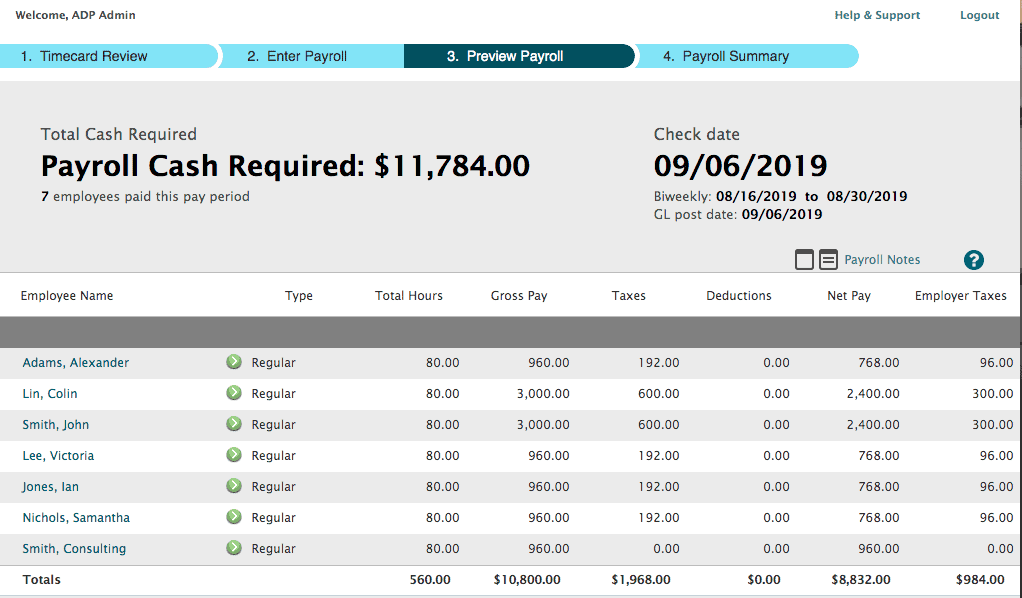
Key Features:
- Range of functionalities: Offers a range of features, including Human Resource Management, Payroll, Benefits, Talent Management, Time & Labor Management, Learning and Analytics, and Return to Office capabilities.
- User-friendly software: Provides innovative and easy-to-use features and offers insights into the flow of work.
- Strong integration capabilities: Supports an integrated and connected ecosystem, easily integrating with third-party solutions.
Pros:
- Scalability and flexibility: Highly scalable, accommodating the needs of businesses of all sizes, and offers flexibility to adapt to evolving payroll requirements.
- Comprehensive compliance: Robust compliance features, staying up-to-date with ever-changing tax laws and regulations, ensuring businesses remain compliant with local, state, and federal requirements.
- Extensive add-ons and integrations: Provides a wide range of add-ons and integrations, allowing businesses to customize their payroll solution with additional features, such as time and attendance tracking, benefits administration, and HR management.
Cons:
- Unclear pricing: Pricing isn’t transparent, and there are additional fees for many tools and features.
- Complex implementation process: Some businesses note that the onboarding process is complicated.
- Expensive solution: Relatively more expensive than other payroll processors, which may be a consideration for businesses with budget restraints.
Client Review:
“I’ve been using ADP Workforce Now for over a decade and it’s been instrumental in streamlining our HR processes. The integration of payroll, benefits, and talent management within one platform has significantly reduced our administrative workload. While the reporting can be complex, the insights gained are invaluable for strategic decision-making. However, it’s worth noting that pricing transparency could be improved, and the occasional technical hiccups can be a setback.”
Hourly: Best for Companies Managing Hourly Employees
Hourly is a dynamic tool designed for businesses with mobile and hourly employees. Its unique selling point lies in combining timekeeping, payroll, and insurance into a seamless system.
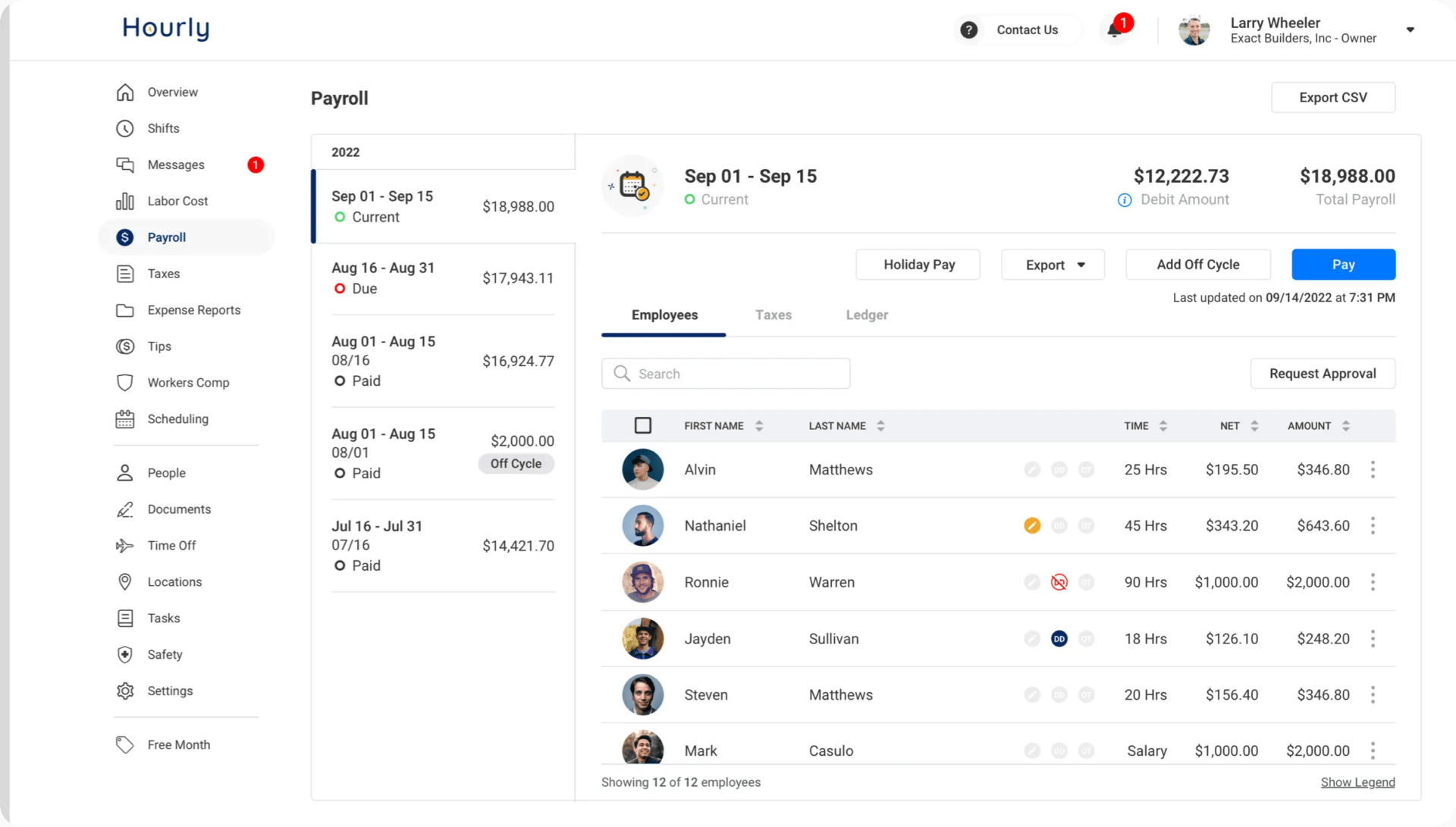
Key Features:
- Time-Tracking: With GPS tracking and real-time alerts, Hourly ensures accurate tracking of employee locations and work hours.
- Payroll Management: Integrates time-tracking data directly into the payroll system, simplifying the payroll process.
- Insurance Handling: Combines workers’ compensation with payroll, streamlining the process.
Pros:
- Additional Tools: Includes digital time cards, job costing, custom pay schedules, detailed payroll reports, automatic tax filing, real-time geofencing alerts, built-in compliance, and audit logs.
- Comprehensive Solution: Hourly is praised as an all-in-one solution for time tracking, payroll, and workers’ comp insurance.
- Affordability: Compared to other options, Hourly is considered cost-effective, especially for small businesses.
Cons:
- Connectivity Issues: Some users report problems in areas with poor cell service.
- Report Customization: Transitioning from other systems like QuickBooks may require adjustment to Hourly’s reporting style.
- Real-Time Updates: The app or web portal may occasionally require a manual refresh for up-to-date information.
- Limited Features for Specific Industries: The need for prevailing wage payroll processing can be a downside for the construction sector.
Client Review:
“Hourly has been a game-changer for us. Its user-friendly interface makes navigating payroll information a breeze. The support team is a standout, offering quick and effective assistance whenever needed. Our only hiccup has been in low-service areas where manual time punching is required, but overall, we are thrilled with the system.”
Asure: Best for Small Businesses
Asure’s platform stands out for its commitment to streamlining and simplifying HR tasks. Their integrated approach covers everything from payroll processing to tax compliance, emphasizing automation and user-friendliness.
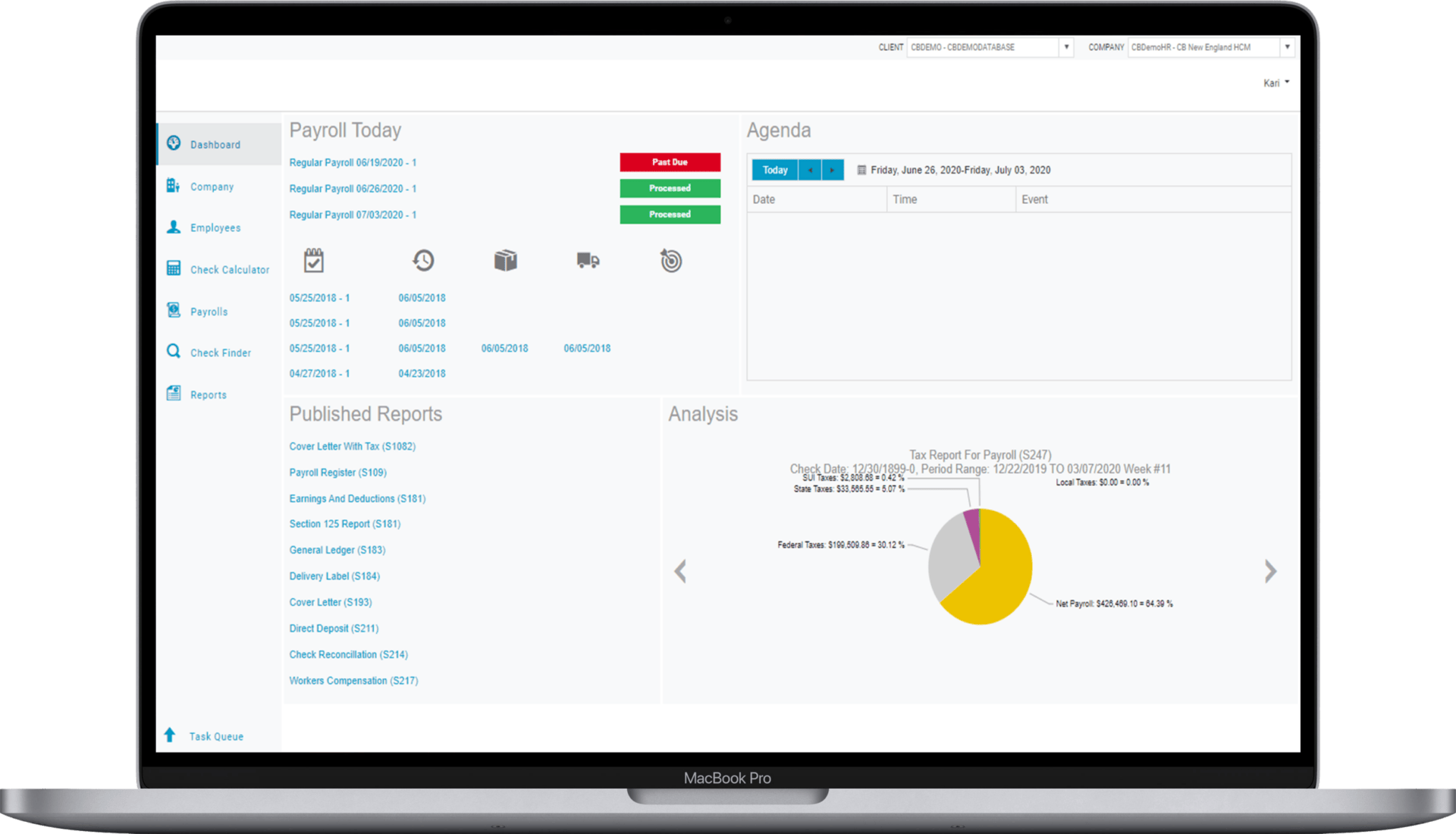
Key Features:
- Tax Compliance: The system handles calculations, payments, and filings, reducing the workload for HR teams.
- Integrations: Asure offers seamless integration with general ledger systems and HR modules.
- Employee Empowerment: Employees have secure access to their pay information, enhancing transparency and engagement.
Pros:
- Efficiency: Asure’s platform automates many payroll tasks, ensuring timely and accurate wage processing.
- Customer Service: Many users highlight the responsive and helpful customer support.
Cons:
- Not Always User-Friendly: Some users find certain aspects of the software less intuitive.
- Adjustment Issues: There can be challenges with configuring specific settings like accrual policies.
Client Review:
“The report function from Asure is great. I am the accountant, so I would need to use all those payroll reports to do any further reporting and analysis. I would be able to get all the reports that I want to see from Asure.”
Square: Best for Contractor-Only Businesses
Square Payroll, renowned for its credit card processing solutions for small retailers, extends its expertise into the payroll domain with two distinct packages catering exclusively to businesses with employees and contractors or contractors.
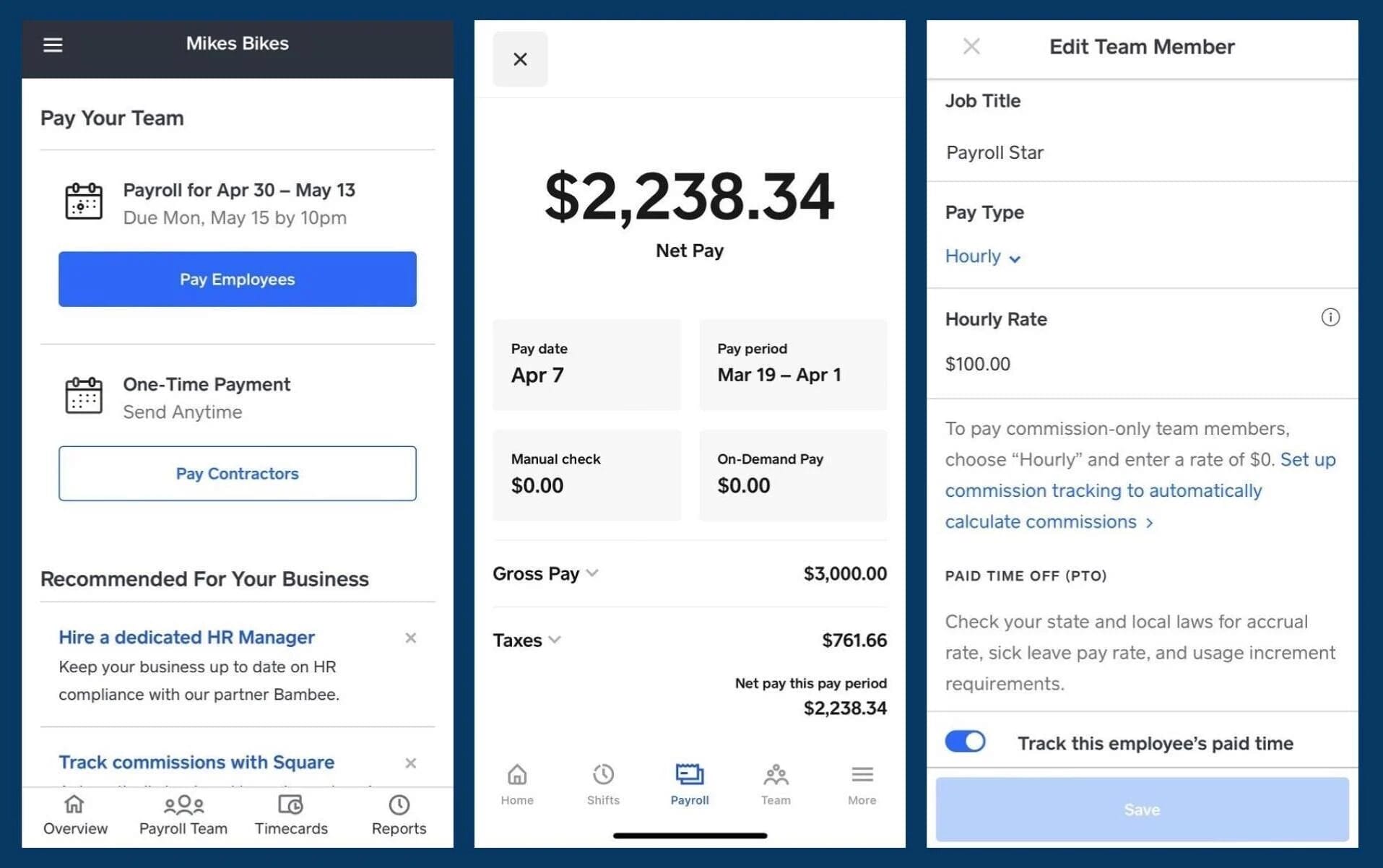
Key Features:
- Automatic Tax Calculations & Filings: Square Payroll simplifies tax compliance by automating calculations and filing business tax forms.
- Seamless Integration: Integrates with Square’s team management and other products, enhancing workflow efficiency.
- Flexible Payment Options: Offers various payment methods, including check, direct deposit, and Cash App.
- Comprehensive Reporting: Integrates with major accounting systems like QuickBooks Online, Xero, and Zoho Books.
Pros:
- User-Friendly Interface: Easy to navigate and integrate into existing workflows.
- Versatile Payment Methods: Offers checks, direct deposits, and Cash App payments.
- Seamless Square Integration: Ideal for businesses already using Square’s suite of services.
- Comprehensive Tax Support: Handles all federal, state, and local tax filings.
Cons:
- Not Ideal for Very Small Businesses: The pricing model might not be cost-effective for very small companies.
- Limited to Square Ecosystem: Best suited for businesses that use Square’s other services.
- Special Account Requirements: Faster payment options require setting up a specific Square account.
Client Review:
“I’ve been using Square Payroll for my small retail business, and it’s been a game-changer. The integration with our Square POS system makes tracking hours and processing payroll a breeze. Tax filings, which used to be a headache, are now handled automatically. However, I wish it offered more flexibility outside the Square ecosystem, as we use a different system for some other business processes. Overall, it’s a solid solution for businesses already embedded in the Square world.”
Choosing the Right Software
Selecting the ideal software for your payroll needs starts at knowing exactly what you need. Once you’ve identified the necessary features for your team’s success, the options may narrow considerably. Your optimal choice is to opt for a payroll platform equipped with payroll and HR capabilities, designed to scale alongside your organization’s growth.
Our platform, PrimePay, provides integrated solutions to over 14,000 companies, ensuring affordability while meeting their specific requirements. Plus, you can incorporate additional functionalities, such as health services or performance management, whenever needed to adapt to your evolving workforce.






